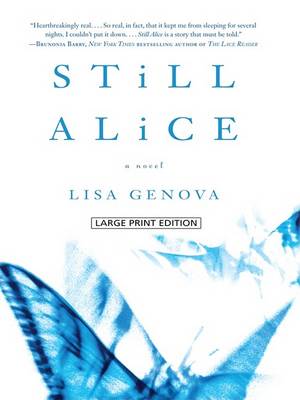"Her mother had comforted her and told her not to be sad for the butterflies, that just because their lives were short didn't mean they were tragic."
It's going to be difficult to articulate my feeling for Still Alice into words, but I'm definitely going to try.
Alice Howland is a brilliant professor of Psychology at Harvard University, a wife and a mother of three children. At the age of fifty she is diagnosed with early onset Alzheimer's Disease and we get to see how this disease affects Alice. Reading about Alice's rapid deterioration from a smart and independent woman to a shell of her former self is extremely emotional.
Still Alice is a terrifying book. It deals with the early onset of Alzheimer's Disease, a disease that I have never given much thought to because:
1)It's a disease that I associated with age.
2)It's a disease that scares me in a way that no other does. My mind, memories and cognitive abilities make me who I am and allow me to be free and independent. I can't imagine losing that.
When Alice starts forgetting little things such as words on the tip of her tongue and where she put things (little things that I do everyday single day and I'm sure many of you do too), she doesn't chalk it up to Alzheimer's disease. She thinks it could be menopause or depression, but then while on a run, she forgets where she is even although she's lived in that same area for more than half of her life and we realise that she is facing something extremely serious. Lisa Genova did her research and uses her degree in neuroscience to show the extremely realistic symptoms of the Alzheimer's disease that affects Alice. I learnt a lot about Alzheimer's disease, not only on an informative level, but also on an extremely emotional level.
Still Alice doesn't only deal with Alice's reaction to her Alzheimer's and the manner in which the disease affects her, but it also shows how Alice's family cope with it. Alice's children could be affected with the Alzheimer's disease gene and while two of her children decide to get tested for it, one of them doesn't and their choices and how this disease affects them is also shown. The relationship between Alice and her husband, after she's diagnosed with Alzheimer's, is extremely heartbreaking to read about, but it's also extremely realistic. At first her husband, John, is in denial and then he starts to distance himself because he's losing the woman that he loved. Even although I didn't agree with his reactions, I understood where he was coming from and why he acted in the manner that he did. Alice's relationship with her children become stronger, especially her relationship with her daughter Lydia, whom she was a little estranged from, and seeing their relationship grow and develop was beautiful to read about.
While this book impacted me on an emotional level - my eyes started watering and I was close to crying - there are two things that I can't ignore when I look at Still Alice critically. While the writing in Still Alice provides an insight into Alzheimer's disease, it is dense, random and choppy. The second thing is a personal criticism. I didn't expect this book to end happily and I knew that the ending was going to be brutal, but the ending felt incomplete and unsatisfying. I can't really explain why I feel this way, I just do.
Still Alice is an extremely important book that deals with Alzheimer's disease not only on an informative level, but also on an emotional level. Even although the writing might have felt dense at times and I wasn't satisfied with the ending, Still Alice is tragic, heartbreaking, but full of hope and love.
"My yesterdays are disappearing and my tomorrows are uncertain, so what do I live for? I live for each day. I live in the moment." (Alice Howland)
